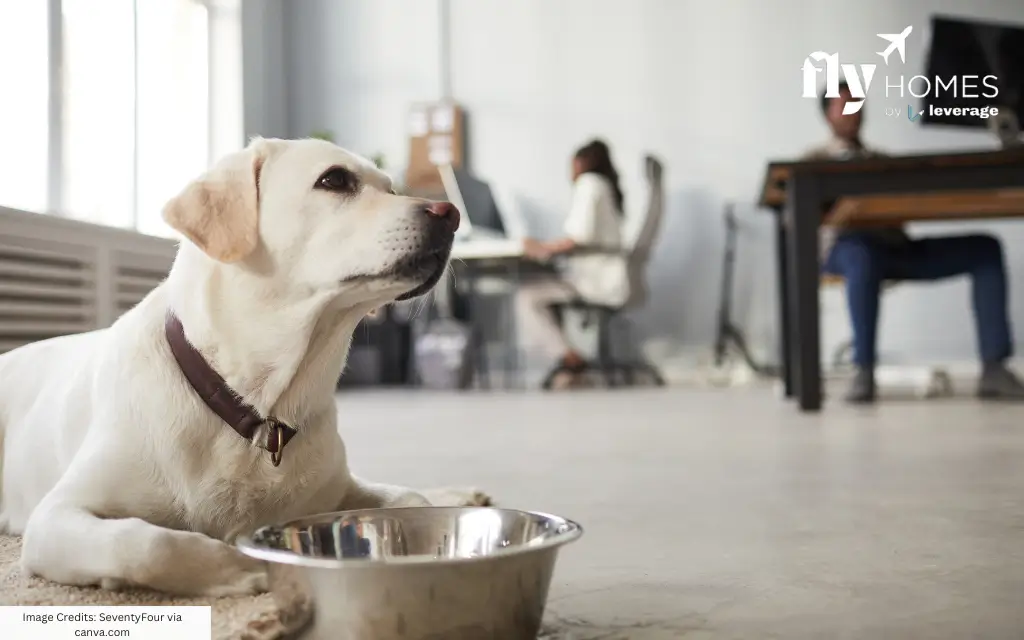Studying abroad is a life-changing experience, offering students the opportunity to explore new cultures, meet people from around the world, and gain valuable academic and life skills. For students who have dogs, the journey can become even more rewarding but also more challenging. Finding the right accommodation that accommodates both the student and their furry companion requires careful planning and research. This guide will provide a comprehensive look at dog-friendly accommodation for students studying abroad, covering everything from why you might want to bring your dog to how to find the perfect place to stay.
Table of contents
- Why Consider Bringing Your Dog Abroad?
- Types of Dog-Friendly Accommodation
- How to Search for Dog-Friendly Accommodation?
- Popular Countries That Allow Dog-Friendly Accommodation
- Things to Look for in Dog-Friendly Accommodation
- Pros and Cons of Dog-Friendly Student Housing
- Legal and Cultural Considerations for Dog-friendly Accommodation
- Tips for a Smooth Transition to a Dog-Friendly Accommodation
- FAQs
Why Consider Bringing Your Dog Abroad?

Bringing your dog abroad can be a deeply rewarding experience, offering companionship and emotional support as you navigate the challenges of studying in a new country. Dogs provide a sense of familiarity and routine, helping to ease homesickness and reduce stress. While it requires planning and effort, the benefits of having your furry friend by your side often outweigh the challenges, making your study abroad journey even more memorable.
- Emotional Support
Your dog is more than just a pet — they’re family. Having them by your side can ease homesickness and reduce stress, especially during big life transitions like moving or studying abroad.
- Built-In Companion
Exploring a new country can get lonely. With your dog, you’ll always have company for walks, weekend adventures, and even lazy days indoors.
- Health and Wellbeing
Dogs need regular exercise, which encourages you to stay active too. Walking or playing outdoors becomes a daily routine, helping you both stay healthy and fit.
- Easier Adjustment
Being in a new environment can be overwhelming. Having your dog can make the adjustment easier by giving you a sense of home and routine.
- Opportunities for Social Interaction
Dogs are natural icebreakers. Whether at the park, pet store, or on the street, they help spark conversations and connect you with fellow dog lovers in your new country.
Types of Dog-Friendly Accommodation

When studying abroad with a dog, finding the right accommodation is crucial for ensuring both your comfort and your pet’s happiness. From student dormitories with pet-friendly policies to private rentals and shared living spaces, there are various housing options to explore. Understanding the types of accommodations available can help you make an informed decision that suits your lifestyle and your furry companion’s needs.
Student Dormitories
While rare, some universities offer pet-friendly accommodations. These accommodations typically have strict guidelines, such as limits on the size or breed of dogs and additional cleaning fees. It’s essential to check with your university’s housing office to see if this option is available.
Private Rentals
Private rentals often provide more flexibility for pet owners. Websites like Zoopla, Rightmove, and Airbnb allow you to filter for pet-friendly options. Contacting landlords directly can also help you negotiate terms for keeping a dog.
Co-living spaces with other students or tenants can be a viable option, but it’s crucial to communicate with potential roommates about your dog. Ensure they are comfortable living with a pet and discuss any shared responsibilities, like walking or feeding, if applicable.
Specialised Pet-Friendly Housing
Some housing platforms cater specifically to pet owners. These accommodations often include dog-friendly amenities such as fenced yards, nearby parks, and even on-site pet care services. While these might be pricier, they offer peace of mind for dog owners.
How to Search for Dog-Friendly Accommodation?

Finding dog-friendly accommodation while studying abroad can seem challenging, but with the right strategies, it becomes much easier. From leveraging online rental platforms and contacting landlords to networking with local communities and utilizing university resources, there are plenty of ways to streamline your search. Knowing where to look and how to approach the process is key to securing the perfect home for you and your dog.
Use Online Platforms
Many websites allow you to filter for pet-friendly housing options. Some popular ones include:
- Airbnb: Use the “pets allowed” filter when searching.
- Zoopla and Rightmove: Both platforms have options to specify pet-friendly rentals.
- Fur-friendly platforms: Look for niche websites or apps specifically designed for pet owners.
Contact Landlords Directly
Reaching out to landlords or property managers directly can sometimes yield better results. Explain your situation and highlight your responsibility as a pet owner. Offering to pay a pet deposit or providing references can make landlords more likely to accommodate your request.
Network Within Communities
Join local student or expat groups on social media platforms like Facebook or Reddit. These communities can provide valuable insights and recommendations for dog-friendly housing.
Utilise University Resources
Many universities have housing offices or student support services that can assist in finding pet-friendly accommodations. Don’t hesitate to ask for help.
Also Read:
Popular Countries That Allow Dog-Friendly Accommodation
There are several countries and universities that are becoming more open to pet-friendly housing options, especially for international students. While not every university offers this directly, many are located in cities where dog-friendly apartments and student housing are available. Let’s look at some countries and universities where it’s easier to live with your dog while studying.
| Country | University/City | Dog-friendly Option | Important Notes |
|---|---|---|---|
| USA | Eckerd College (Florida) | On-campus pet-friendly dorms | One of the few with official pet dorms – small dogs allowed. |
| University of Washington | Off-campus housing with pet-friendly listings | Seattle has many student apartments with dog-friendly rules. | |
| University of California, Davis | Nearby pet-friendly housing | UC Davis has vet and pet services close to campus. | |
| UK | University of Winchester | Pet-friendly rooms (case-by-case) | Requires written approval; mostly off-campus housing recommended. |
| University of Edinburgh | Dog-friendly private rentals nearby | Many flats in Edinburgh welcome pets, but student housing often doesn’t. | |
| Canada | University of British Columbia (UBC) | Off-campus pet-friendly housing | Vancouver is known for being a very dog-friendly city. |
| University of Guelph | Off-campus pet-friendly accommodations | Guelph has a strong vet and animal science program too! | |
| Australia | University of Melbourne | Off-campus dog-friendly units | Melbourne has student apartment providers with pet-friendly options. |
| University of Queensland | Shared and private housing with pet approval | Requires prior landlord permission – Brisbane is generally pet-friendly. | |
| Germany | Berlin (Free University of Berlin) | Private rentals allow dogs | Most student housing is strict, but private apartments are more flexible. |
| Netherlands | Utrecht University | Private housing near campus | Dogs are allowed in most rentals, but university housing is stricter. |
Things to Look for in Dog-Friendly Accommodation

When searching for housing, it’s crucial to prioritise features that ensure both your comfort and your dog’s well-being. Look for accommodations with pet-friendly amenities, such as nearby parks for exercise, secure outdoor spaces, and clear policies on pets. Choosing the right environment can help create a stress-free and happy living situation for both you and your furry companion.
- Proximity to Parks and Green Spaces
Living near a park or open space is ideal for daily walks and playtime. This is particularly important in urban areas where outdoor space might be limited.
- Pet-Friendly Rules and Facilities
Check if the accommodation has specific pet policies. Some places may require pets to be leashed in common areas or may prohibit certain breeds.
- Noise and Damage Policies
Ensure you’re aware of any penalties for noise complaints or property damage caused by your dog. Understanding these rules upfront can prevent future disputes.
- Accessibility to Veterinary Services and Pet Supplies
Having a vet nearby is crucial in case of emergencies. Also, check for local pet supply stores or delivery options for dog food and other essentials.
Pros and Cons of Dog-Friendly Student Housing
With Dog-Friendly Student accommodation, here are certain pros and cons of such accommodations. Look at the table below to understand about the pros and cons of Dog-Friendly Student Housing:
| Pros | Cons |
|---|---|
| Emotional Support: Helps reduce loneliness, stress, and homesickness. | Extra Costs: You may have to pay a pet deposit or higher rent. |
| Routine & Responsibility: Caring for your dog builds routine and time management. | Limited Options: Fewer housing choices are available for pet owners. |
| Great Icebreaker: Dogs make socialising with other students easier. | Rules & Restrictions: Breed or size restrictions might apply. |
| Encourages Outdoor Time: Regular walks can improve your mental and physical health. | Potential Allergies/Complaints: Roommates or neighbours may not be comfortable with pets. |
| Feels Like Home: Having your dog around gives a sense of comfort and familiarity. | Time Commitment: Dogs need time, attention, and care — even during exams. |
Legal and Cultural Considerations for Dog-friendly Accommodation
When moving abroad with your dog, understanding the legal and cultural considerations is essential to ensure a smooth transition. Each country has specific regulations for pet ownership, including vaccination requirements and breed restrictions, as well as varying cultural attitudes toward dogs. Being informed about these aspects helps you and your pet adapt seamlessly to your new environment.
Local Pet Ownership Laws
Each country has unique regulations governing pet ownership, so it\u2019s important to familiarise yourself with the rules before arriving. Research leash laws to understand where and how your dog can be walked, as well as any breed restrictions that might limit certain dog types. Additionally, ensure your dog meets all vaccination requirements, such as mandatory rabies shots, to comply with local health and safety standards.
Cultural Attitudes Toward Pets
Cultural attitudes toward dogs can vary widely across countries. In some cultures, dogs are cherished as beloved family members, while in others, they may be viewed as outdoor animals or even seen with hesitation due to religious or societal norms. Being aware of these perspectives can help you navigate interactions with neighbours and community members respectfully, ensuring smoother social integration for both you and your dog.
Documentation and Permits
Ensure you have all necessary documentation for your dog, including:
- Vaccination records.
- Microchip information.
- Are any permits required by your host country or city?
Tips for a Smooth Transition to a Dog-Friendly Accommodation
Planning to move into a dog-friendly place? Here are simple tips to ensure a smooth transition for both you and your furry friend, making your new home safe, comfy, and welcoming.
Preparing Your Dog for the Move
- Acclimate your dog to a travel crate before the journey.
- Ensure all vaccinations and health checks are up to date.
- Pack familiar items like toys, blankets, and treats to comfort your dog during travel.
Settling Into the New Environment
- Establish a routine as soon as possible to help your dog adjust.
- Introduce your dog to the neighbourhood gradually, allowing them to become familiar with their new surroundings.
Balancing Studies and Pet Care
- Create a schedule that accommodates your dog’s needs without compromising your academic responsibilities.
- Consider hiring a dog walker or pet sitter during busy periods.
Building a Support Network
- Local pet communities can offer insights on pet-friendly services, dog parks, and veterinarians in your area.
- Meet fellow dog owners, form friendships, and share experiences.
- Arrange pet-sitting or dog-walking exchanges with trusted members of the community.
Also Read:
- Cheap Student Accommodation in Dublin for Students Abroad
- Cheapest Student Accommodation in Sydney [2025]
Bringing your dog abroad as a student is a rewarding yet challenging endeavour. With careful planning, research, and a proactive approach, you can find the perfect dog-friendly accommodation that meets your needs. Your dog can provide invaluable emotional support and companionship during your study abroad journey, making the experience even more memorable.
Start your search today, and remember that a little extra effort now can lead to a comfortable and happy life for both you and your furry friend. For booking the best student accommodation abroad to start your study abroad experience you can contact Fly Homes at 1800572118.
FAQs
A dog-friendly accommodation is a place that allows guests to bring their dogs during their stay. It provides amenities and policies that cater to pets, such as designated areas or pet services.
While most universities do not allow pets in student dormitories, some institutions offer pet-friendly housing options. These typically have strict rules, such as size or breed limitations and additional cleaning fees.
Start by using online rental platforms like Airbnb, Zoopla, or Rightmove, which allow you to filter for pet-friendly properties. Contact landlords directly to inquire about their pet policies. Joining local expat or student groups on social media can also help you find recommendations or leads for pet-friendly rentals.
Be upfront about your dog and demonstrate your responsibility as a pet owner. Offer to pay a pet deposit or provide references from previous landlords who can vouch for you and your dog. Highlight that your dog is well-trained and won’t cause damage or disturbances.
Open communication is key. Discuss their concerns and try to address them, such as keeping your dog in your room, ensuring cleanliness, and maintaining quietness. It might also help to introduce them to your dog gradually.
Dogs need regular exercise, and having a nearby park or green space makes it easier to take them for walks and allow them to play. This is especially important in urban areas where there may be limited outdoor space. Proximity to such areas ensures your dog remains physically and mentally healthy.
The requirements vary by country but generally include- Vaccination records (especially rabies vaccination), a valid pet passport or health certificate, microchip registration details, import permits (in some countries), research the specific entry requirements for your destination and start preparing well in advance to avoid delays.
Beyond rent and utilities, consider pet deposits or additional cleaning fees in housing. Food, grooming, and healthcare expenses, pet insurance premiums, and travel costs for your dog (e.g., airline fees or pet transportation services).
Acclimate your dog to a travel crate well before the trip to reduce anxiety. Ensure they are up-to-date on vaccinations and have a vet-issued health certificate.
Establish a consistent routine from day one to give your dog a sense of stability. Introduce them to the new environment gradually by exploring the neighbourhood and nearby parks. Use familiar items like toys and bedding to make the new place feel more like home.
Yes, several platforms cater to pet-friendly housing. Popular ones include- Airbnb: Which use the “pets allowed” filter. BringFido: Focuses on pet-friendly lodging, PetsWelcome: Which lists accommodations that cater to pet owners.
Universities in countries like the US and Canada are more likely to offer such accommodations. Always check with the housing office of your university to confirm their policies.
Follow Us on Social Media




























